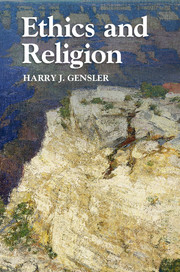6 - Natural Law and Spirituality
from PART II - ETHICS AS NATURAL LAWS
Published online by Cambridge University Press: 05 May 2016
Summary
On our theistic natural law, our duties depend on our God-given nature – as rational, biological, and spiritual beings:
1. Rational: Be vividly aware of the relevant facts, avoid falsehoods, and be consistent (GR, ends-means, etc.).
2. Biological: Avoid stealing, lying, killing, adultery, etc.
3. Spiritual: Love God with your entire being.
We'll now investigate the basic spirituality duty and see what this adds to morality.
A Spirituality Norm
I'll express the supreme spirituality principle (SPR) in two ways. The first is a qualified ought-form:
SPR: If there's a God (in the sense of a supremely wise and loving Creator), then rational creatures who are called to eternal life with God ought, as far as practically possible, to love God with their entire being.
The duty to love God is contingent on there being a Creator who is supremely wise and loving, and calls us to eternal life with him; this duty wouldn't apply, for example, if the world had no Creator or else had one like the hateful Ares (§3.1). SPR's second formulation is a simplified imperative form:
SPR: Love God with your entire being.
The first form is more technically precise; the second is easier to read. I'll move freely between the two forms (with the technical form's qualifications being implicit in the simpler form).
Here I take “wise” to mean “satisfies the norms of practical reason” (§4.2.7) and “loving” to mean “satisfies GR and cares for others for their own sake” (§4.6). God's wisdom and love include these, but likely go much further.
Atheists could accept SPR as purely hypothetical: if there's such a God (which they reject), then we ought to love him with our entire being. Here I'll assume that there is such a God. I won't worry about the status of this assumption – whether it can be based on human reason or must instead be based on revelation. If it requires revelation, then the duty to love God isn't part of natural law (as we've defined it) but rather is part of supernatural law, and then this discussion is theological rather than philosophical.
- Type
- Chapter
- Information
- Ethics and Religion , pp. 112 - 132Publisher: Cambridge University PressPrint publication year: 2016



